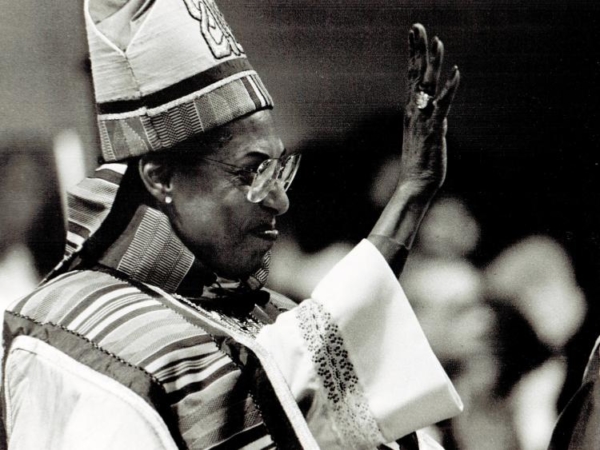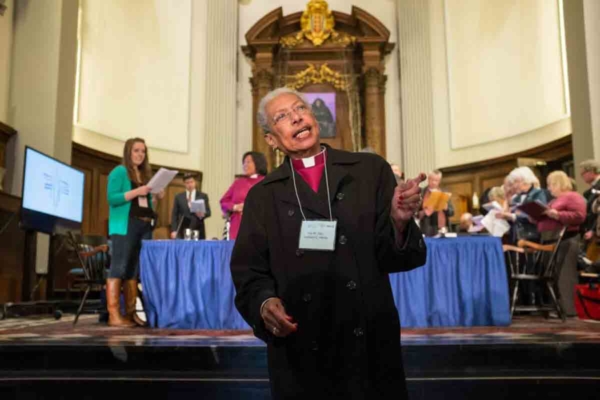Movement grows to honor Bishop Barbara Harris with a feast day on her date of deathPosted Sep 29, 2021 |
|

The Rt. Rev. Barbara Harris at her historic consecration service on Feb. 11, 1989. Photo: David Zadig/Diocese of Massachusetts
[Episcopal News Service] Dioceses and Episcopal leaders are joining a growing movement to add Bishop Barbara Harris to The Episcopal Church’s calendar of Lesser Feasts and Fasts. They are lining up diocesan resolutions that will ask the 80th General Convention to advance her elevation to the status of a church saint at its meeting in July 2022, just two years after her death.
Harris was consecrated in 1989 as bishop suffragan of the Diocese of Massachusetts, becoming the first female bishop in the Anglican Communion. She retired in 2002 but remained an active and prominent figure in The Episcopal Church and a role model for younger generations of Episcopal leaders until her death March 13, 2020, at age 89. Harris also is remembered for her support of social justice causes and her part in the first wave of women to be ordained as Episcopal priests.
“Bishop Barbara Harris’s life and ministry called out to us to strive for justice and truth as manifested in Scripture in our church and world,” Bishop Gayle Harris, the Diocese of Massachusetts’ current suffragan, said in an email statement to Episcopal News Service. “Her voice was an uncompromised clarion call for full inclusion and equality in our corporate life as the Body of Christ from the beginning of her ministry as a lay leader and throughout her episcopacy.”
In February 2021, she and Massachusetts Bishop Alan Gates issued an invitation to congregations and dioceses across the church to celebrate the life of the late bishop on the first anniversary of her death. Gates and Harris then asked for brief descriptions of those commemorations because “such accounts may become part of the testimony for subsequent consideration of churchwide observation.”
In November, Massachusetts will vote on a resolution at its diocesan convention endorsing the push to create a churchwide feast day on March 13 honoring Harris, echoing a resolution approved in July by the Union of Black Episcopalians. Other dioceses are considering similar resolutions, including California, Los Angeles, Missouri and New York.
Proponents plan to cite examples of local commemorations in making their case for adding Harris to the liturgical calendar as one of its optional observances, alongside the church’s principal feasts and holy days that are listed in the Book of Common Prayer. The church’s Standing Commission on Liturgy and Music, or SCLM, has emphasized such a record of “local, organic observance” be part of the “Principles of Revision” for Lesser Feasts and Fasts, which the commission submitted to the 80th General Convention for consideration. (The guidelines can be found here, starting on page 11.)
“There should be a history of people having celebrations of someone they want on the calendar. It shouldn’t be top down,” Byron Rushing, vice president of the House of Deputies, told ENS in an interview. He thinks that qualification has been met by the widespread enthusiasm for commemorations of Harris since her death.
The pandemic forced church leaders temporarily to shelve plans for large-scale, in-person memorial services honoring Harris. While such memorials are still pending, numerous virtual services were held to mark the one year anniversary of her death.
Rushing and other advocates of a Harris feast day also are in favor of expediting her inclusion in the church calendar. The Episcopal Church’s Canons don’t specify rules for conferring sainthood, though individuals traditionally aren’t considered until 50 years after death.
“The passage of time permits the testing and flowering of their Christian witness,” SCLM says in its guidelines.
Exceptions, however, can be made with approval of General Convention. In 2018, for example the 50-year precedent was waived when the 79th General Convention approved the addition of Thurgood Marshall, Pauli Murray and Florence Li Tim-Oi.
Because the liturgical calendar is part of the Book of Common Prayer, additions must be approved by two successive General Conventions. If approved, a trial-use liturgy for a Harris feast day would return to General Convention for final approval in 2024.

Retired Bishop Suffragan Barbara Harris leads members of the Diocese of Massachusetts in singing hymns during its 2014 electing convention. Photo: Diocese of Massachusetts
A feast day honoring Harris already has a leading contender for its liturgical propers. Missouri Bishop Deon Johnson wrote a prayer to be used as a collect honoring Harris, and he selected accompanying biblical readings, in consultation with one of Harris’ close friends, the Rev. Sandye Wilson. Those propers now are being used in Johnson’s St. Louis-based diocese and were recommended by the Massachusetts bishops for use there and in other dioceses.
Johnson told ENS that Harris served as his mentor while he was attending General Theological Seminary in New York, and “she’s always been a role model figure for me throughout her ministry.”
She congratulated him when he was elected bishop in November 2019, but she died before he was consecrated in June 2020. For that ceremony, Johnson chose to honor her with the propers he had written.
The collect calls on God to ”defend us in our own day to make no peace with oppression; that boldly following the example of your servant Barbara Clementine Harris, chosen bishop in your church, we may strive not for ease or fame but gladly toil and walk with you all along our pilgrim journey.”
Missouri is drafting its own resolution calling for a churchwide feast day on March 13, which Johnson said is deserved because of “her example in being Christ’s hands and heart for social justice and welcome in The Episcopal Church.”
Even before being elected bishop, Harris “was an outstanding minister for social justice in The Episcopal Church,” Rushing said, citing her work in the civil rights movement, her advocacy for women’s equality and her ministry to prison inmates.
“She had a deep history of social justice work,” Rushing said. “That of course is one of the reasons why Massachusetts elected her.”
– David Paulsen is an editor and reporter for Episcopal News Service. He can be reached at dpaulsen@episcopalchurch.org.

Social Menu